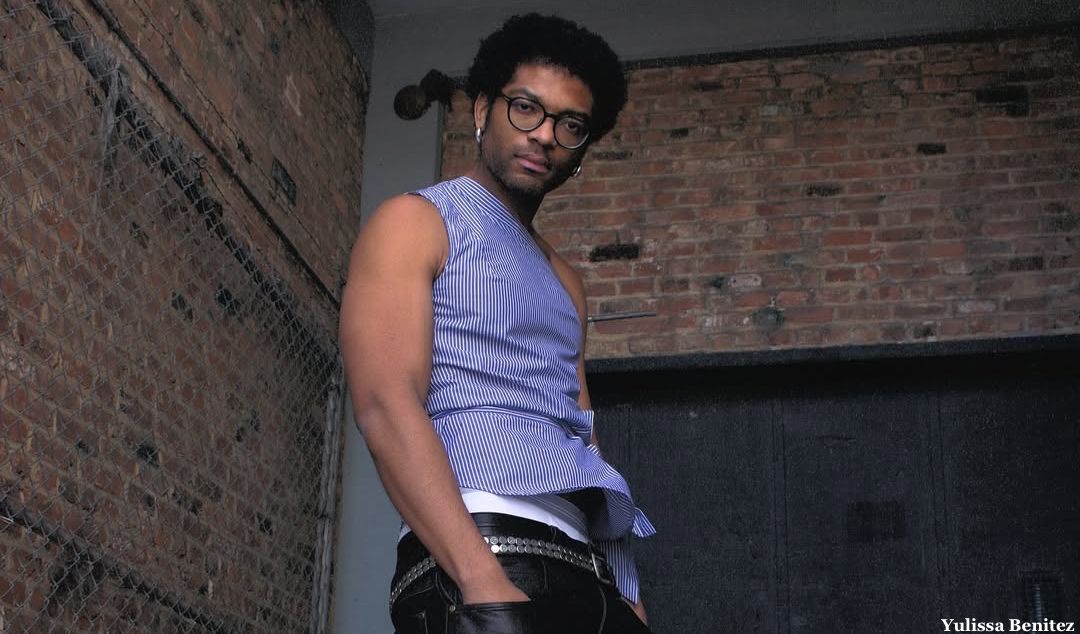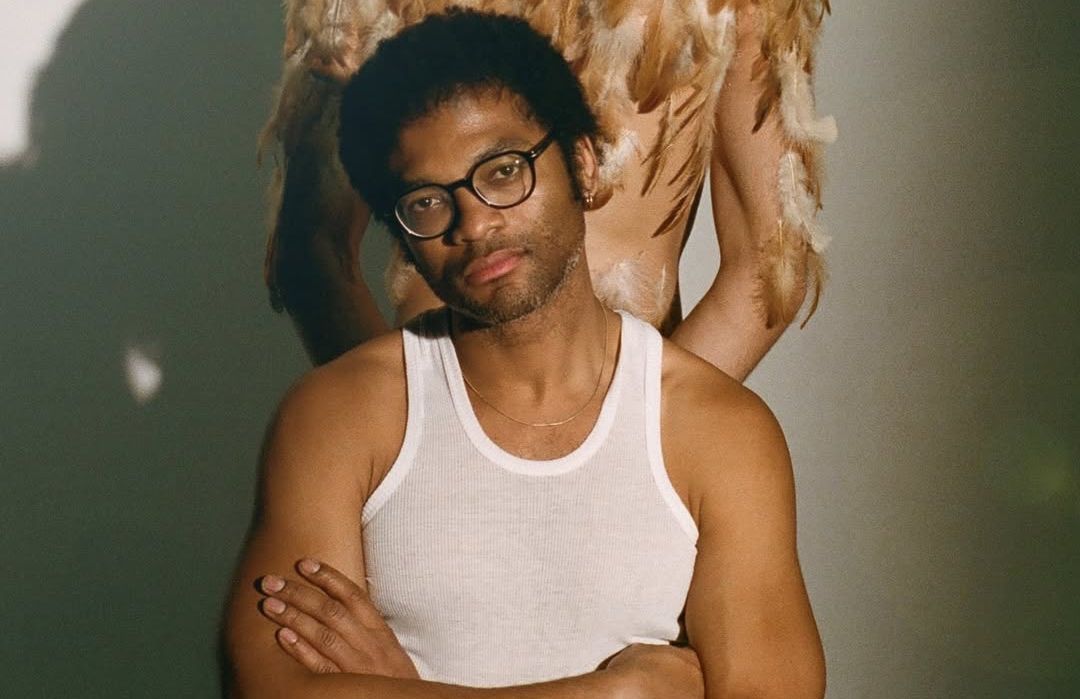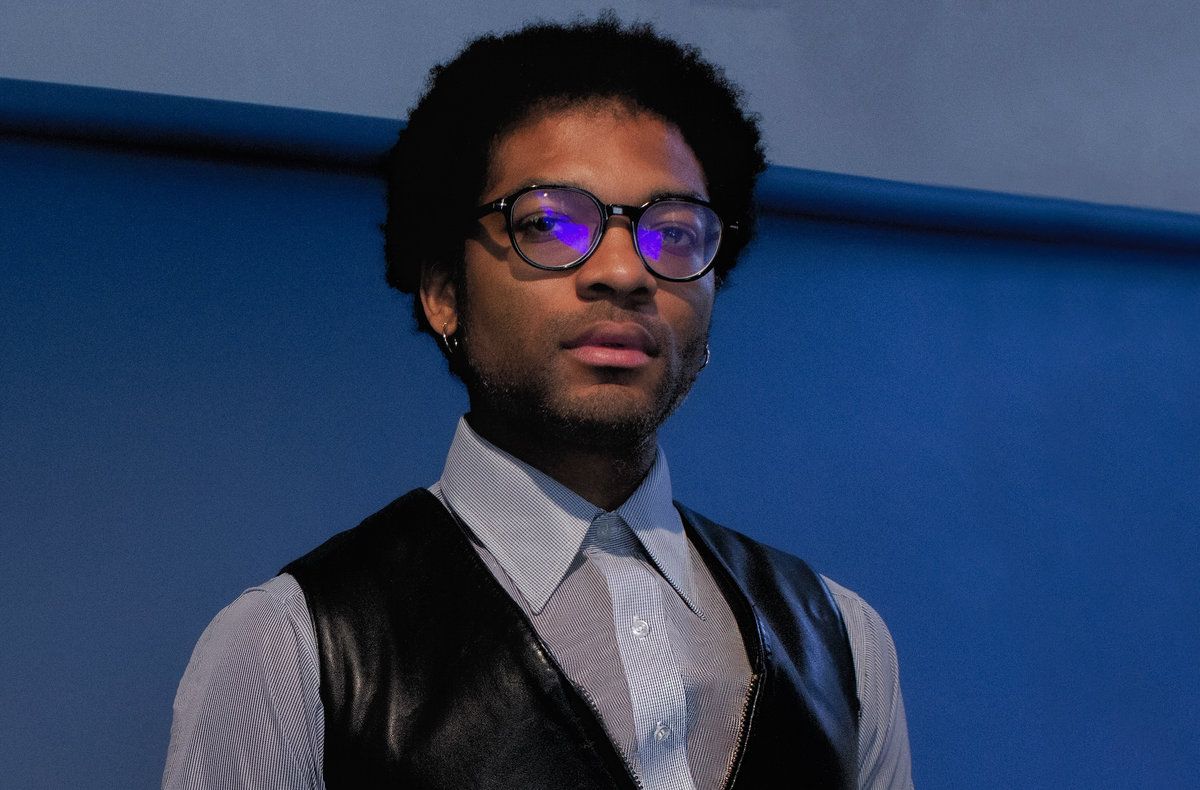Fusilier – Setting an Ambush with Indie Rock & a Radical Type of Love

Brooklyn-based indie rock artist Fusilier (pronounced fyoo-suh-leer) knows that at times it can feel like the world is designed to sabotage our happiness, but he isn’t going to let us go down without a fight.
“Everybody’s so serious about things that ultimately don’t affect them,” he explains, “I have friends that I try to save from their own algorithm, and the things that they say to me. I’m just like – this has nothing to do with you, and also, this is boring. Don’t you want to talk about something that you’re excited about?”
Excitement is palpable in Fusilier’s music, and while he feels having fun has “become a lost art in our culture,” he does note that not every lyric is a call for a good time.
“I don’t want to say that I owe the audience honesty,” he says, “but it’s the artist’s job to convey honesty.”
All of these personal philosophies are wrapped up in Fusilier’s full-length debut, Ambush, which is due out March 28th, and has been a decade in the making.
Having been involved in the music scenes in Atlanta, Boston, and now Brooklyn, the bold sound of Ambush is an amalgamation of his time in each of those cities.
I caught up with Fusilier over Zoom to find out more about Ambush, and he discussed the musical and emotional inspirations behind the album, as well as the radical type of love he’s embracing with it, and where you might find him at 4:30 in the morning.
Listening to Ambush, it’s clear you have a plethora of musical influences. What’s a night like when Fusilier has control of the playlist?
Oh, it depends on the night. I have so many musical influences that I will defer to the mood.
I think I learned really early on that people don’t always want to go down a path with you, you can’t just force people to do it, so it’s pretty eclectic, but mainly on a night we’re doing … I’m really into hyperpop now.
Yeah?
Yeah. I think you can hear it in the intro (to Ambush), too. I’m thinking a lot about BABYMETAL, the Japanese band. These things that are really hard, but also really cutesy.
As soon as BABYMETAL came out, and I heard “Gimme Chocolate!!,” I was like – This is the greatest thing in the world. How come no one had invented it yet?
It’s great.
You’ve released EPs in the past. Why was now the time you wanted to release an LP? You’ve noted it’s 10 years in the making.
Well, basically, I sort of released things based on, “Am I currently capable of producing the highest level of this song?” So I think that 10 year period was me, you know, leaving my band (RIBS), taking myself seriously as a solo artist, and then meeting the people who would get the vision, and could help me produce these songs at the level they deserve, and I think I finally did that. The album sounds exactly like I wanted to do it. Couldn’t be happier.
It starts with the hyper aggressive title track, and those drums that kick off everything. Why did you want that song batting leadoff?
I really like percussion pieces. I think most of my songs are percussion pieces, especially the ones that are seemingly repetitive. There’s a lot of nuance in the percussion.
I also think that this was the clearest way to get my confluence of influences out in a way that I think people would pay attention. I hate when you put on an album and the first thing that plays is just like a (regular) song. For me, I thought it was going to be a statement.
I just think in this day and age, we’re competing against television and the Internet, the first thing people hear has to be attention grabbing.
It almost, at one point, seems like there’s a battle cry in the middle of the song.
Yeah, I think that probably came out of the 2020 protest.

I read you’ve described the album as being about falling in love during the end of the world. Who, or what, are you falling in love with?
Mostly myself right now, actually.
I’ve really come around to loving every part of myself, and that’s kind of all we can do is love ourselves, and the people around us.
Why do you think it’s so hard for so many of us to fall in love with ourselves?
We’re always being told there’s something wrong, something to fix, and that the answer is consumption. It’s hard to convince people that’s wrong. It runs so counter to so many things that we’re taught from childhood that you start to sound like, you know, a worthless hippie, to use a stereotype from the 1960s. Anything that’s centered on self-love, and on the philosophy that you have what you’re looking for already, it starts to sound like alternative medicine, so it’s immediately rejected.
We’re bombarded with a lot of messages through advertising, and television. I think every commercial is basically telling us something's wrong with us.
Right, and hence, this is the ambush.
With the ambush being something that we deal with every day, how have you found ways to counteract it?
I don’t know that it’s possible. I think they’ve got us. These algorithms are so good at giving us the high fructose corn syrup versions of our own consciousness, and just telling us that our presence is being rewarded on them.
I try to be smart about it, but I don't know that there’s any way to outsmart the tidal wave, to outrun the tsunami. I’m just focused on my own personal happiness, not to be hedonistic about it, but I’m just very focused on feeling good.
On the album’s second single, “Nightmare Muscle,” there’s a line that definitely gave me pause, because it involves a word I don’t say – “Never let a faggot run the peep show.” Is there a reclamation of that word going on? How did that line end up in the song?
We just talk like that with each other.
There’s so much about this album, and its mythology, about queer world building, and how people who are outsiders to the culture can then see the culture very clearly.
I get a lot of influence, I suppose, from black trans women, who have the most insightful, cutting things to say about our society. No one wants to listen to them, but they tend to be correct. So that’s the following line – “I can tell you where to look, you might not like it, though.”
You know, outsiders have some pretty incisive commentary, and criticism, and answers for how we can better ourselves in society … (but) we’re not going to do any of them, because they’re challenging.
They take effort.
They take effort, and they take considering the needs of others, and it’s just too hard.
I get the feeling you enjoy breaking boundaries, both in music, and in life. Do you feel the word “rebel” applies to you and/or your work?
There’s certainly a rebellious spirit that runs through it.
I don’t know that it applies to me. I think my frustration is that I’ve been so tamed by society.
Last year I read Isabel Wilkerson’s book, Caste, and I noticed all the ways in which I’m socialized to shrink myself, and I think I’m trying to break out of that. So when you talk about the title track, or any of these moments of intensity, I think they’re frustration.
I don’t know that I’ve actually gotten anger in my music yet. I don’t think I'm comfortable with it. I think I’m afraid of the punishment that comes with actual anger.
You were in music scenes in Atlanta, and Boston, before calling New York City home. What from your time in each of those scenes can you identify in your music, like, “I didn’t have this until I lived there”?
Well, I’m from Atlanta, so if you listen to any of the percussion grooves, the feel is always going to be rooted in hip-hop, or funk. When I’m at my loosest, and my most confident, that’s probably the swagger that I get. It’s going to be that Southern thing, like OutKast, or Future. There’s something so visceral about it, and it’s where my band, and my music is going to come from.
I think I learned from Boston – I didn’t go to Berkeley, but the band that I was in was Berkeley students – their penchant for experimentation, and subverting musical cliches. I’m very much a pop person, so I do like to use them to serve pop music, but I think that’s sort of an exploratory nature.
Also just learning how to be in a scene, and exist parallel, or in a community with all these different bands. It was really cool to break that ego down.
And New York, you know, obviously, is such a dynamic city, and it will tell you what you’re missing very quickly.

You mentioned you love pop music. Do you ever dig through used vinyl, or used CDs?
I don’t. I’m a digital person. I think it’s this environmentalist streak in me that I just don’t like touching things.
OK, but you are constantly growing musically, so with the digital world in mind, what musical rabbit holes are you diving into now that maybe could influence your work in the future?
Oh, what a great question.
A lot of dance music, experimental dance music, Latin dance music. I was in Argentina for a bit, and their take on hip-hop is kind of like a fun house mirror thing that I’m not sure that I like as a fan, but I think it’s interesting social commentary. I’d say that, and underground electronic (music).
Living in New York has allowed me to be in these scenes, like being out at 4:30am in my neighborhood, Bushwick, at a club. I just really like that feeling of the bass moving through your body, all the subdivisions of higher frequency percussion.
I do want to stay in the rock lane, but something about electronic, and dance music just really calls to me.
You can combine them.
Well, the question is how, and I think I’ve done that on this album, where the dance influences are 20th century based. I think I want to figure out how to combine them to make something that’s 21st century (based). That’s kind of what I’m getting at, which is why I love hyperpop, getting back into things that are rough edges.
I’m super excited to keep exploring it.
For more Fusilier, check out linktr.ee/Fusilier.

Comments